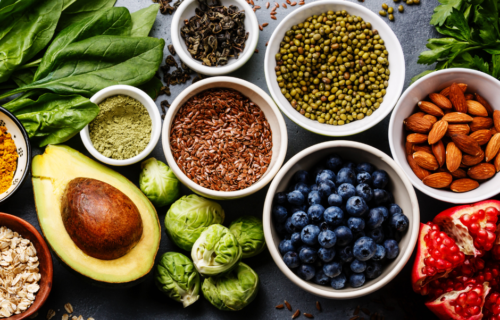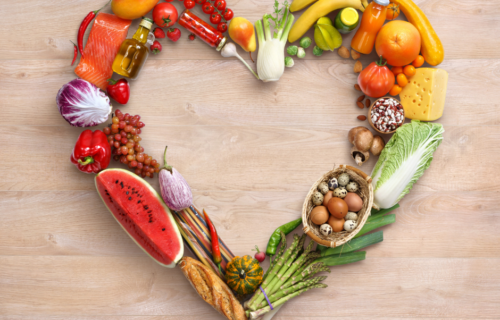
What to Eat After Exercise
Way to go! You completed your exercise for the day! Now it’s time to reward yourself with a donut and a mocha Frappuccino.
Wait, what?
Did I have you going there, just for a second?
When you work out, do you ever think about what foods you can eat afterward because you exercised today?
I find that a lot of people think about rewarding themselves with “cheat foods” for successfully completing the punishment of exercise.
However, this line of thinking is not going to get you the results you desire from living a healthy lifestyle.
Exercise is not the punishment. Exercise is the reward.
Exercise is treating your body with the respect and self-care you deserve.
Post-exercise nutrition is also a reward. It is a thank you to your body for working so hard to support you.
So, how do you give your body a proper thank you?
Your Body on Exercise
When you exercise, your body breaks down muscle.
Muscles grow when they rest and recover.
So, optimizing recovery is an important part of exercise.
There is a thing called the anabolic window.
This is a fancy science word that simply means there is about a 30-minute window of time after exercise or performance that is the ideal time for your body to use carbohydrates (glucose for energy) and protein.
During this window of time, the muscles can better absorb protein, carbs, and other vitamins and minerals.
The goal is to replenish muscles so that they grow and recover faster.
Eating carbohydrates immediately after exercise replenishes glycogen storage (what the body uses for energy) 2x more than if you consumed them 2+ hours after exercise.
Choosing Your Carbs
Say this next sentence out loud with me. Carbs are not bad.
Your body needs carbs for energy, brain power, heart health, and improved gut health, among many other reasons.
Carbs have gotten a bad reputation in diet communities, leading to the mentality that all carbs are bad.
The Standard American Diet is made up of too many processed carbohydrates. These are foods that are made up of mostly added sugar and limited nutrients (i.e. french fries, chips, soda, cookies, etc)
What’s the first food that comes to mind when you think carbs?
Bread? Pasta?
Yep, those foods contain carbs. Breads and pastas are typically made from highly processed ingredients, including white flour, and they typically lack other beneficial nutrients.
The key to getting the most benefit from eating carbs is to choose the ones that offer the most nutrients.
Remember, fruits and vegetables are carbs, too!
A combination of fast and slow digesting carbs will help to immediately replenish energy needs and aid in prolonged energy.
Fast-digesting carbohydrates (aka simple carbohydrates) are easy to digest and supply the body with energy very quickly. Simple carbs are mostly sugars found in refined grain products, some fruits, honey, and some dairy.
You can also find them in high-sugar foods such as candy and soda – but these are not your ideal choice for fast-acting carbohydrates!
Note: Simple carbs can be a good option before a workout if you need a quick boost of energy.
Slow-digesting carbs (aka complex carbohydrates) – such as sweet potatoes, wild and brown rice, beans, legumes, vegetables, red potatoes, oat bran, rolled oats, and whole-grain and whole-wheat breads – are loaded with nutrients and fiber. These foods produce relatively slow increases in blood glucose, meaning they give you energy over time rather than a quick jolt.
Add Protein
Adding protein with carbs to the post workout meal maximizes the body’s ability to restore glycogen levels (energy), reduce muscle damage, and repair muscles (which equals less time feeling sore).
The recommended ratio of carbs to protein varies between experts, but is generally 2:1 to 4:1 carbs to protein ratio.
For example, 50 grams of carbs and 25 grams of protein (2:1) or 60 grams of carbs and 15 grams of protein (4:1).
Has all that science and math talk got your head spinning?
No worries, let’s keep it simple.
This article from Healthline offers a great, simplified explanation of carbs, and suggests just 2 rules to follow to make sure you are getting the good-for-you carbs.
Follow these 2 rules for fueling your body in the right way post-exercise.
-
Eat whole foods, not processed
Take advantage of getting more nutrients through whole foods without all the extra added junk.
Have a piece of whole fruit, rather than fruit juice. The whole fruit contains valuable fiber that get left out when you drink just the juice.
-
Combine your macro nutrients when possible (protein, carbs, fat)
Easily cover all your bases without needing to do all the calculations when you combine food sources. Your body gets all the nutrients it needs, and you get the convenience of an easily prepared snack.
Try plain Greek yogurt (protein + fat) and add your own fruit (carbs + fiber + vitamins and minerals).
Here are some more examples of great post-exercise snacks:
Whole grain toast with nut butter
Cottage cheese with fruit
Tuna with whole grain crackers
Quinoa bowl with berries and pecans
Oatmeal with banana and almonds
Protein shake and a banana
Don’t Forget the Water
Refueling your body after exercise is not just about the food you are eating. Remember to drink your water after an exercise session. It is important to replace the fluids and electrolytes lost through your sweat within 12 hours of your workout.
If your workout intensity was high and/or lasted more than 60 minutes, make sure to replace the electrolytes through a boosted water or sports drink that contains electrolytes such as sodium and potassium. Just be sure to read the ingredients list to look for and avoid processed ingredients and artificial sugars.
Timing is Everything?
Here is the thing… timing meals around workouts has been used by athletes and bodybuilders for decades.
However, many studies show that most people don’t need to replenish carbohydrate or protein stores right away.
If you ate a few hours before a workout, your body will likely be able to use some of that fuel during the anabolic window. So, eating exactly 30 minutes after your workout may not be so crucial.
However, if you are working out first thing in the morning or are in a fasted state (have not eaten for 3 hours or more), then you will need to eat something within that anabolic window to replenish your energy stores and repair the muscles.
Cap off your refueling routine by following up with a balanced meal within 4 hours of your exercise session.
Reap the Rewards
Refueling your body with healthy food post-exercise is important for helping your muscles restore and helping your body continue to function most efficiently.
However, fueling in the right way isn’t just something for you to focus on only after exercise. Eating healthy, whole foods is part of living a healthy lifestyle, thanking your body for all it does for you.
Eating healthful foods is a form of self-care, just like exercise is a form of self-care.
Reward your body, and your body will reward you right back.
What is your favorite post-exercise snack?



